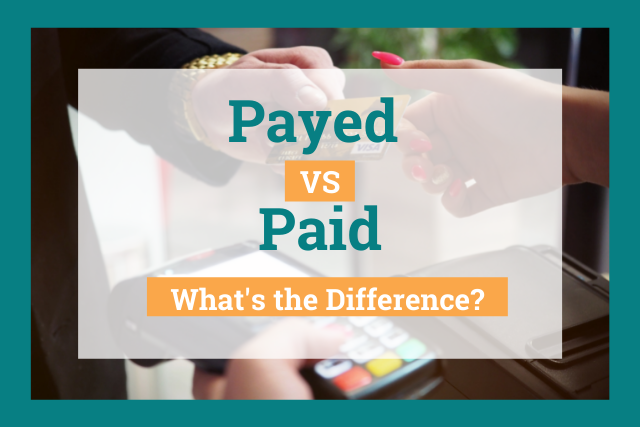
There’s a lot of confusion around the difference between paid and payed, since they’re both pronounced the same way.
The good news is that unless you spend a lot of time on a boat, you actually don’t have to worry about payed. Just go with paid.
In this article, we’ll help you remember the difference between paid and payed, and show examples of each word in context.
Paid vs Payed: What’s the Difference?
Let’s start with a basic definition of each of these words:
- Payed: either to have sealed the deck of a ship to prevent leaks, or to straighten out a rope gradually
- Paid: either to have given someone money, or to have received a loss or misfortune
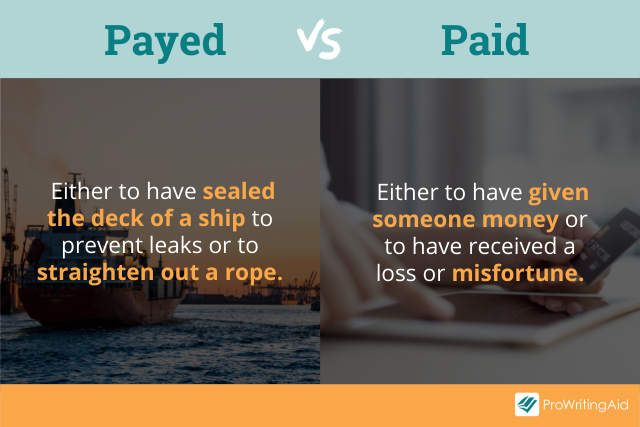
TIP: To remember the difference, think of a sailor’s favorite word: Aye, as in “Aye, aye, captain!” Thus, sailors like to say payed, while everyone else says paid.
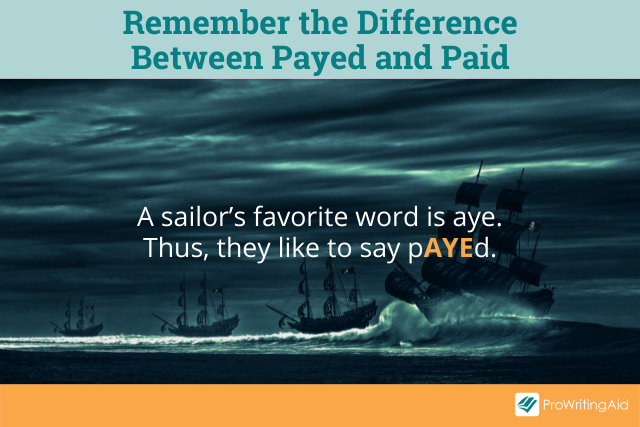
The Past Tense Form of the Verb “Pay”
Anytime you’re talking about having given someone money or some other form of barter, you should change the verb pay to paid to switch from present tense to past tense.
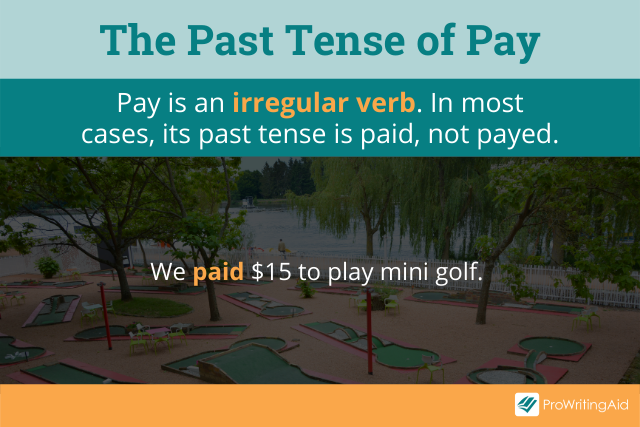
The verb pay is irregular, which means that its past tense is a special case.
You can’t just add “-ed” at the end to change it to past tense, the way you do with regular verbs such as “jump” (“jumped”), “paint” (“painted”), or “stay” (“stayed”). Instead, you have to use a special spelling for the correct past tense form—paid.
For example, you would say, “I paid with a credit card,” which is the past tense of “I pay with a credit card.”
Is Payed Actually a Word?
The word payed is a real word, but it’s much rarer than paid. In fact, you should only use this spelling if you’re talking about boats or ropes.
Nautical Term 1: Payed the Deck
The first seafaring definition of payed occurs when you seal the deck of a wooden ship in an attempt to avoid leaks.
For example, you would write “The sailor payed the deck to make it seaworthy.”
Basically, if you can say “the deck” after it, then you may be able to use payed.
Nautical Term 2: Payed the Rope
Another time you might be able to use the term payed is if you are talking about rope.
This is also used mostly on ships. You’ve probably seen a rope being slowly straightened before. If so, then you know what this is referring to.
That process is called paying the rope, and in its past-tense form, it becomes payed.
For example, you would write “She payed out the rope to raise the sail.”
In this case, if you can say “out the rope” after it, then you may be able to use the word payed.
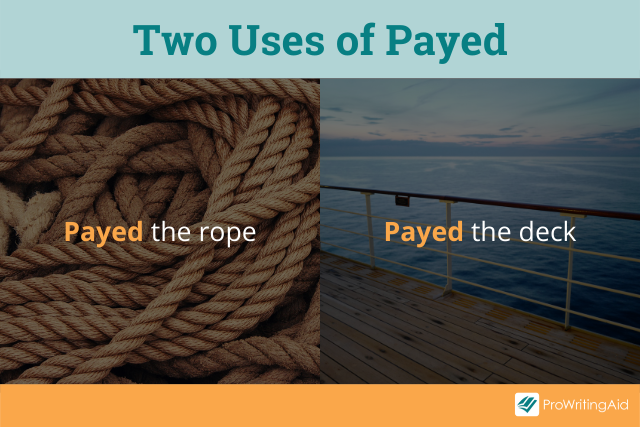
Examples of Payed vs. Paid in Sentences
Let’s look at some examples of payed and paid in a sentence.
Examples of “Payed” in the Nautical Sense
Remember that you should only use payed if you’re talking about ships or ropes.
Here are some examples of payed in a sentence:
- The seaman payed the hull as a punishment for disobeying an order.
- They payed out the rope so the sailors could climb down.
- We payed out the rope to lower the anchor.
Examples of “Paid” as in Payment
One of the most common definitions of pay is to give money or other forms of barter. With this definition, you use the irregular verb, paid.
Here are some examples of paid as in payment:
- She paid the valet to park her car.
- I paid full price for this designer gown.
- We paid the babysitter before we left.
Examples of “Paid” as in Revenge or Misfortune
Another way you might use the irregular verb of pay is when you are talking about making someone pay for their actions. In this case, you should also use paid.
Here are some examples of paid as in revenge or misfortune:
- You hurt her terribly, and you paid the price.
- He paid for his crimes with a year in prison.
- We have paid for our mistakes three-fold!
Is It Paid Attention or Payed Attention?
A common question people ask is this: “Is it paid attention or payed attention?”
In this case, you are still talking about a form of payment. However, instead of money, you are paying with attention.
Here are some examples of paid as in “pay attention”:
- My son never paid attention in school, so we had to hire him a private tutor.
- The man next door paid more attention to his dogs than to his children.
- If you ever paid attention to me, you’d know why I am mad!
You can use ProWritingAid’s grammar checker to check if you’re using any of these phrases incorrectly. With a quick check, you can ensure that your writing is clean and error-free.
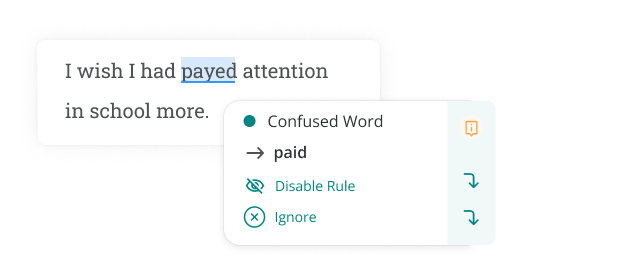
Is It Paid Off or Payed Off?
Another common question is: “Do you get paid off or payed off?”
Once again, the answer is simple. Always go with paid when you aren’t using nautical terms.
Here are some examples of paid as in “pay off”:
- I’m glad our gamble finally paid off.
- She tried something new and it paid off.
- We finally paid off our student loans last year.
Examples of “Paid” as an Adjective
Let’s look at some examples where pay isn’t a verb at all, but an adjective.
As a reminder, an adjective is a word that describes a noun. Paid can be an adjective in certain situations.
Here are some examples of paid as an adjective:
- The company is offering paid sick leave.
- She is a paid contributor to that newspaper.
- That is a paid-for house.
Final Words
In general, payed vs. paid isn’t that complicated. Away from the sea, just go with paid and you are likely good.
What are your favorite tips for remembering the difference between “paid” and “payed”? Let us know in the comments.


